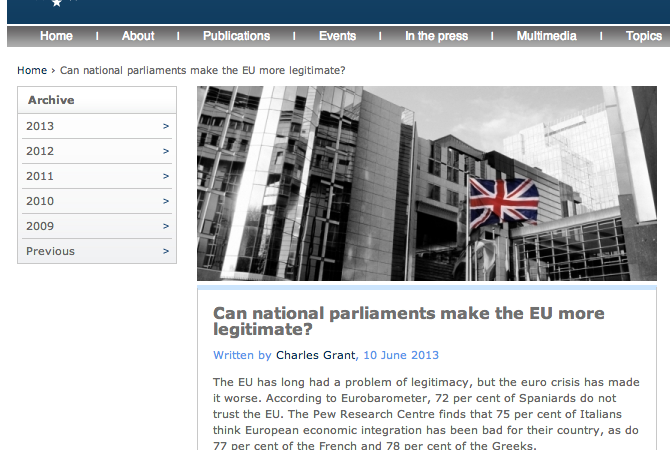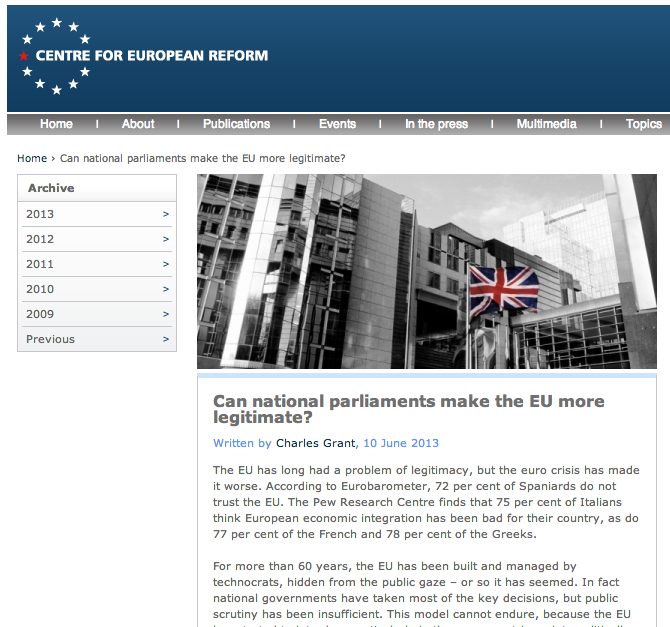CER on national parliaments in EU decision making

 Charles Grant of the London-based think tank CER has written a piece entitled “Can national parliaments make the EU more legitimate?” Of course, having posed that question, Grant does not actually fully nail his colours to the mast as to whether he actually thinks national parliaments will help the EU become more legitimate. The piece instead contains imprecise thinking, and a lack of theoretical rigour. In fact all of it is rather typical of this debate about national parliaments’ role in the EU decision making.
Charles Grant of the London-based think tank CER has written a piece entitled “Can national parliaments make the EU more legitimate?” Of course, having posed that question, Grant does not actually fully nail his colours to the mast as to whether he actually thinks national parliaments will help the EU become more legitimate. The piece instead contains imprecise thinking, and a lack of theoretical rigour. In fact all of it is rather typical of this debate about national parliaments’ role in the EU decision making.
As far as I am concerned this national parliaments and the EU thing is based on two false premises that need to be challenged. The first is that national parliaments are necessarily more trusted than the European Parliament is, and the second is that national parliaments actually give a damn about the EU.
In the latest EU Barometer (from Autumn 2012), 28% of Europeans say they trust their national parliaments (p. 39 of the PDF here), versus 27% who trust their national governments. Meanwhile 44% “tend to trust” the European Parliament (p. 71 of the same PDF). So Grant’s case that greater involvement of national parliaments is necessary to legitimise the EU does not really hold true. Also only in 2 Member States – Denmark and the Netherlands – do people trust their parliaments significantly more than governments.
Secondly, if you are a member of a national parliament, why should you actually care about EU matters? Experience to date seems to show that unless it’s something major – like Eurozone bailouts and votes on that in the German Bundestag – national parliaments actually are pretty lousy at using the powers they currently have in EU affairs. I explore some of the reasons for this here. National parliaments could better scrutinise ministers before they go to Council meetings, and hold them to account, but that’s hard and time consuming work. Why do that, rather than be pictured meeting some children in the local school, or talking about healthcare? Grant seems to completely miss this point in his piece – no new forum of national parliamentarians is needed. They do not collaborate because they have no incentive to do so, not because they lack the forum to do so.
Grant criticises the European Parliament thus: “But few voters are aware of the Parliament’s good work and many of them are sceptical that MEPs represent their interests; a lot of MEPs have little connection to national political systems.” But he fails to examine why this is so, or indeed work out how things could work differently.
The basic problem with the European Parliament is not its lack of powers per se, because it is a full co-legislator. But the European Parliament lacks the power to shape the direction of European integration in any way that could be understandable to a voter. It does not comply with Schumpeter’s basic four points of a functioning party political system*:
Parties present programmes
Voters make an informed choice between competing parties
The successful party puts its programme into practice
The governing party judged on its successes at the next election
This is at the heart of the issue of why the European Parliament, and indeed the EU as a whole – it does not function as a representative democracy in the way any other level of representative democracy does, and the only way to improve the input legitimacy of the EU is to address this issue (by making the Commission dependent on the outcome of the European elections for example).
Trying to make the EU more legitimate through emphasising the role of national parliaments is the wrong issue to address. So, Charles, here is the one word answer to the question you pose in the title of your piece: NO.
* – Adapted from Schumpeter, J.A. [1943] (1976), Capitalism, Socialism and Democracy, 5th Edition, London, Allen & Unwin, quoted in Judge, D. & Earnshaw, D.,The European Parliament
[UPDATE – 1955]
Turns out that writing this rubbish for CER was not enough, but he has followed it up on Comment is Free as well. Sorry Charles, but this is poor.
I’m planning to write a post of my own on this topic, I just haven’t gotten around to it yet. The main idea on which I would rest my thinking is that of vertical balance of powers. In a good (con)federal system, the liberty of the people is safeguarded through both horizontal separation of powers (legislature, executive and judiciary) and vertical. Just like at every level the three branches act as a check on one another, so too do the different levels amongst each other.
Then again, the point of splitting up power in this way is to end up with less frivolous legislation, which may not be entirely to your liking…
Jon, thanks for this post. I would offer a counterpoint to each of your two counter-arguments:
1. The EP is more trusted: perhaps, but how many people actually know what the EP does and who their own MEPs are? You trust more what you think is weaker and you know less. I wouldn’t be surprised that people trust the OSCE more than NATO for instance, but is it a good enough reason to give more competences to the OSCE in terms of say European civilian missions?
2. Why should MPs care about the EU? That’s a very, very valid question that we (hopefully) will tackle soon. In many European countries, the level of knowledge on the EU is limited (euphemism), but at the same time all treaties have offered national parliaments increasing competencies in EU matters. So they OUGHT to be care!
Overall, national parliaments remain more legitimate than the EP, not because the EP does a poor job, but because it is less accountable in the eyes of the public (not enough knowledge about what it is doing and broad disinterest in its existence). It can change – the EP is very young institution.
Where I am more doubtful is on the legitimacy aspect. I see the theoretical case for it, but I’m not convinced by its reality in practice. But empowering national parliaments can have a spillover effect. If they care more, if they need to get more involved in European affairs, that can trickle down to more Europe in parliamentary affairs at large, which will bring about more media attention and more public attention. Not necessarily a bad thing.
Great contribution Jon.
This is the kind of debate that we call a marronnier in France, an old chestnut. The underlying idea is that the more local an institution is, the more legitimate its decisions are likely to be. A terrible idea actually as we notice how it translates into more red tape when we apply such idea in oure national context; how local public figures are increasingly shaping national politics and actually locking the entire system.
The true objective of those who campaign for such complex political architectures is how to make change impossible. I do not wish the European Union such a system.
Hi!
Thank you! This is a very crucial debate. National parliaments don’t have legitimacy over European affairs, even with the intergovernmental system its a big mistake and a betrayal to act like it would have any legitimacy.
Jon,
There are many separate questions in Grant’s article which would merit discussion, but let me offer two earlier blog posts as an introduction from a different perspective on democracy:
http://grahnlaw.blogs.fi/2013/06/02/another-plague-from-vague-hague-16081813/
http://grahnlaw.blogs.fi/2013/06/03/red-card-disembowels-eu-and-democracy-16084753/
The right issues should be decided – accountably – at the right level. You are right about what democratic choice is about.
One of the reasons, I think, for pro-Europeans of a British kind, is that they need to come up with something that makes the EU fit their wish to keep their country inside, not what is best for EU citizens and the union as such. Sadly, neither democracy (input), nor outcomes improve.
Yes, there are countries with fairly good scrutiny of EU affairs, including Council meetings (Denmark, Finland, Sweden), but 27 different scrutiny processes do not add up to real democracy of even citizens’ participation.